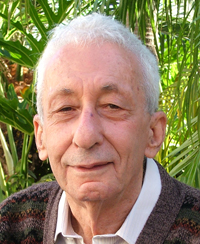
Dr. David Wesley
By Fanny Dassie
April 17, 2009
The complex relationship between Palestinians and Israeli Jews living in Israel was witnessed and experienced by Israeli anthropologist Dr. David Wesley, who decided to report on this issue in his 2006 book State Practices and Zionist Images: Shaping Economic Development In Arab Towns In Israel, which he discussed Wednesday during a conference in San Francisco held by the California Institute of Integral studies.
Born and raised in Detroit, Michigan, Wesley moved to Israel in 1955 when he was 23, to be part of history, a history that he could see unfold before his eyes.
“I felt like I was at a place where I could participate to build a Jewish life,” he said.
Wesley witnessed first hand Jewish refugees emigrating en masse from Europe to Israel following the holocaust, a state Jews previously declared as their own in 1948 in a former Palestinian territory allotted to them by the United Nations. The Zionist movement, which states that Jews, like any other nation, are entitled to a homeland, was born.
But soon after the State of Israel was established by UN charter, Palestinians were forced to flee their homeland. Those Palestinians that stayed were subjected to discrimination and land confiscation policies, as well as strict military rule.
Wesley, who settled in a Kibbutz, an agriculture-based collective community in Israel until 1986, experienced Palestinian-Israeli relations to their full extent and the contradictions that followed.
In the 1990s, he began anthropological research “to look at the interactions between neighbouring Jewish communities and Palestinians,” research that ultimately dominated his book.
Wesley said the Israeli government referred to Palestinians as “Arabs”, that Palestinians were subjected to health, income and housing discrimination. He said Palestinian townships within Israel encountered zoning, budget, and infrastructure investment discrimination.
“Although Jewish law recognizes equal rights, there was no recognition of collective minority rights,” Wesley said, referring to the 1948 Declaration of Independence of the state of Israel that declares that Jews and Arabs be treated fairly and equally under the law.
Wesley cited the land price differences in the Arab settlement of Kafr Kanna and the Jewish settlement of Upper Nazareth as an example of the Jewish authorities’ discrimination system. When Wesley confronted Jewish authorities on why Kafr Kanna land prices were three and a half times higher than in Upper Nazareth, he was told Upper Nazareth was a new city that needed promotional help from the government and that land pricing differences had nothing to do with discrimination.
“Normalization took place,” Wesley said. “It was normal for prices to be high.”
According to Wesley, the discrimination Palestinians faced within Israel and the slow economic development in Arab towns has its origin in Zionist images: fear from the threat of Arab territorialization and traditionalism.
“Even though it was an image, it was a definite nuisance on the ground that resulted in the loss of Arab lands,” Wesley said, referring to Israeli fears Arab towns may expand and come to dominate a geographical area.
Subjected to policies of discrimination and injustice, Palestinians reacted accordingly, he said.
“It would be a mistake to consider Palestinians as passive victims,” Wesley explained. “They have found a voice to protest the kind of activities that took place. Their political action mobilized public opinion and got the price of lands equalized.”
Beyond political actions, prominent Palestinians living in Israel drafted “The Future Vision of the Palestinian Arabs in Israel,” a 2006 document that analyzes ways for Jews and Arabs to peacefully coexist in Israel. The text was received with controversy by the Israeli authorities but Wesley believes it can be the basis for dialogue.
“It is hard for the Israeli Jews to see the discriminations, but not everybody is blind,” Wesley said. “Some have a sense of what has taken place,” adding that discriminatory Israeli government policies against Palestinians must be acknowledged before injustices can be honestly addressed.


 The Hunger Site
The Hunger Site
April 17, 2009 at 1:42 pm
In a highly controversial book, “When and How Was the Jewish People Invented?”, Israeli scholar Shlomo Sand argues, among other things, that: (a) the Diaspora–the founding narrative of modern Israel–was actually a myth, there being no evidence that the Romans drove all the Jews into the wilderness en masse; (b) many of the European Jews who moved to Palestine after the Holocaust were really not related to the Jews who once dwelt in the Holy Land, but had descended from Europeans living in the Kingdom of the Khazars (in eastern Russia), who converted to Judaism in the 8th or 9th century; and (c) that the people known as “Palestinians” today are probably descendents of the Jews who lived in Jesus’s time. Sand’s book calls into question some long held paradigms such as the argument that “the Jews” are an eternal monad, who have somehow stayed genetically distinct from every other people throughout history and that the Jews who live in Israel today are the direct descendents of the Jews whom Moses guided to the Promised Land. Sand’s book should make for some lively discussion.